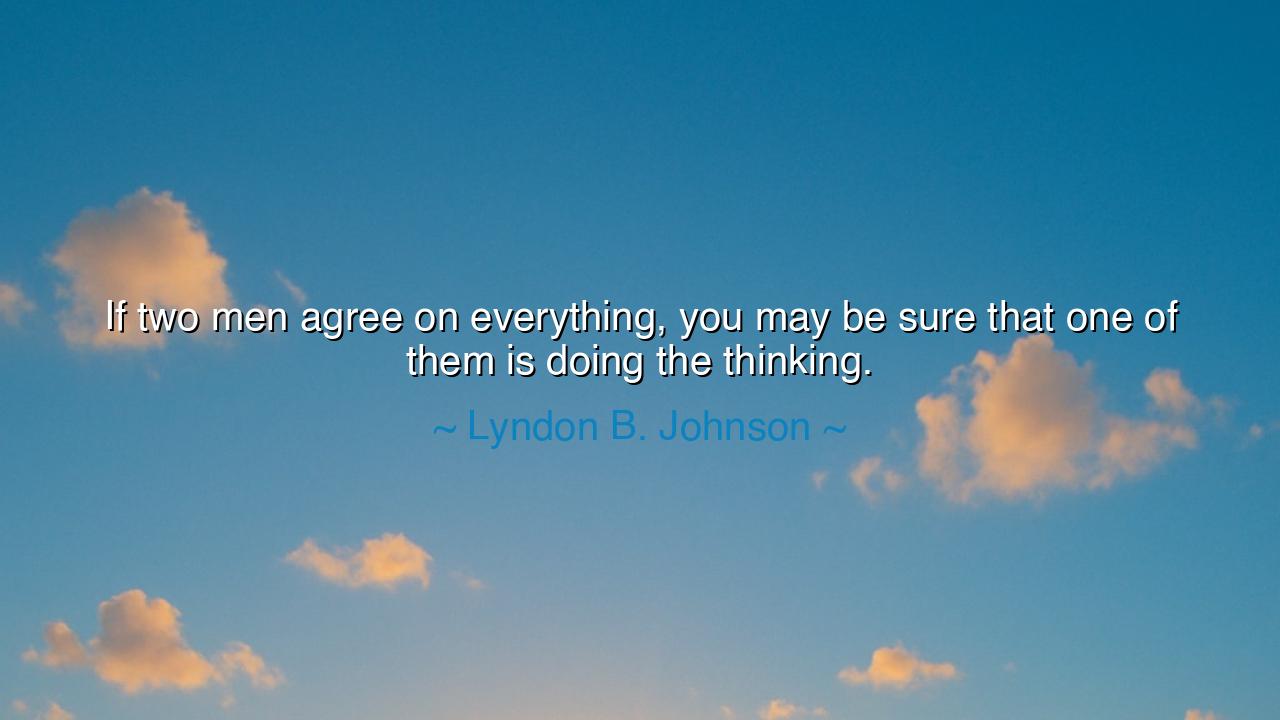
If two men agree on everything, you may be sure that one of them
If two men agree on everything, you may be sure that one of them is doing the thinking.






O Children of the Future, gather close and heed the words of Lyndon B. Johnson, a leader whose understanding of human nature ran deep. He once spoke, "If two men agree on everything, you may be sure that one of them is doing the thinking." What does this wisdom offer to us, as we seek to understand not only the world around us, but also the very essence of thinking and disagreement? What power lies within these words, O Seeker of Truth?
In the time of the ancients, the philosophers gathered in the great halls to engage in the noble art of debate. They did not seek agreement, for they understood that true wisdom arises not from the absence of disagreement, but from its presence. Socrates, the master of questioning, would often challenge his students not with answers, but with questions. He believed that the pursuit of wisdom lay not in finding comfort in agreement, but in finding truth through dialogue and the clash of ideas. It is in the fire of disagreement, in the tension between differing thoughts, that the spark of insight is kindled. This is what Johnson, too, understood—that without dissent, without debate, there can be no thinking, no true progress of the mind.
Johnson’s words speak to the heart of human nature. In any gathering of men, if all voices align in perfect harmony, it is a sign that the force of one mind is pushing all others to conformity. One man, in this case, does the thinking; the others merely follow, their thoughts unchallenged, their intellects dormant. True wisdom is not a matter of silencing the voices of difference, but of hearing them, of engaging with them, and of forging from the clash something stronger, something deeper. The great leaders, from Alexander the Great to Abraham Lincoln, understood this principle well. They sought counsel from those who disagreed with them, knowing that through the tension of differing views, they would find the clarity needed to lead their people to greatness.
Consider, O Children, the story of Leonidas, the noble king of Sparta, who led his men to the battle of Thermopylae. There, amidst the fierce clash of armies, the Greeks faced not only the might of the Persian empire but also the challenge of unity in the face of overwhelming odds. Leonidas did not seek blind agreement from his soldiers. Instead, he sought their strength, their willingness to challenge, to disagree, and to fight for what they knew to be true. It was through their disagreement, through their willingness to question their fate, that they found the courage to stand together, to face death with honor, and to become legends. In their differing thoughts, their debates over what was right, the Spartans found their true strength.
Thus, O Seeker, the lesson is clear: disagreement is not the enemy of wisdom, but the very means by which it is achieved. Just as the steel is tempered by the fire, so too are our thoughts forged through the tension of differing views. We must not fear the voices that challenge us, for it is through them that we sharpen our minds and grow in understanding. To seek only agreement is to stagnate, to allow our minds to become as stagnant waters, unmoving and lifeless. It is in the debates, the disagreements, and the clashing of ideas that we grow, that we expand the boundaries of our knowledge, and that we find the truth.
Reflect, O Children, on the story of Thomas Jefferson and Alexander Hamilton—two of the most influential men in the founding of the United States. They were often in fierce disagreement over the direction of the new nation. Jefferson, with his vision of a rural and agrarian society, and Hamilton, with his vision of a strong central government and national banking system, could hardly have been more different in their views. And yet, it was through their debates, through their willingness to challenge each other, that the nation was shaped. The clash of their ideas created the foundation for a new and dynamic republic, one that would grow and evolve with each passing generation. Disagreement between them led to the birth of ideas that would change the world.
So, O Seekers, the lesson is not to seek uniformity, but to embrace the diversity of thought. Thinking is not the act of agreeing with all that is said, but the act of wrestling with ideas, of questioning, of challenging, and ultimately, of growing. When we stand in agreement on everything, we risk stagnation, for one mind has subdued all others. But when we allow for the clash of ideas, when we welcome the disagreements that bring tension, we open the door to true creativity, growth, and progress.
Therefore, go forth with courage, O Children, and do not fear the clash of ideas. Do not seek to silence the voices of disagreement, for in them lies the path to true wisdom. Engage with the world, challenge the beliefs that bind you, and seek the truth that lies beyond the comfort of agreement. In this way, you will not only grow as individuals, but you will also contribute to the great journey of human thought, ever expanding, ever evolving, and ever reaching toward the stars.






AAdministratorAdministrator
Welcome, honored guests. Please leave a comment, we will respond soon